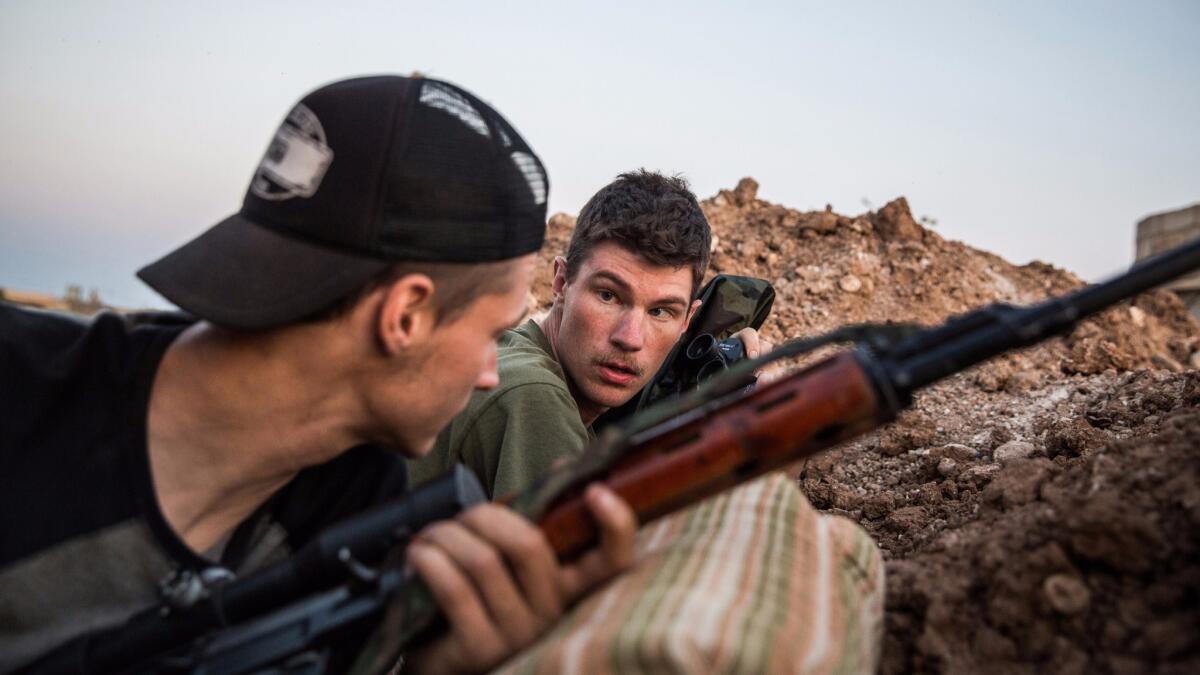Friends, family salute American who died fighting Islamic State in Syria

Reporting from Arvada, colo. — On a crisp autumn day in a small hillside church, Levi Shirley’s remarkable journey from suburban Denver to the battlefields of Syria came to an end.
The Rev. Rebecca Brown recited a poem by Robert Frost:
“Two roads diverged in a wood and I – I took the one less traveled by, And that has made all the difference.”
It was a fitting tribute for a young man whose desire to be a part of something bigger than himself led him from washing dishes at a local Red Robin restaurant to battling some of the most dangerous militants in the world.
Shirley wanted to be a Marine, a dream thwarted by his poor eyesight. So he found another path to service — one that ran through the Kurdish rebels battling Islamic State in Syria. He joined up and was quickly in the thick of the fight.
On July 14, during intense urban combat in Manbij, a city of 100,000 in northern Syria, Shirley, 24, was killed by an improvised explosive device.
It took nearly two months to get him back home. His body and that of fellow Coloradan Jordan MacTaggart, 22, killed in the same battle, arrived by train Sept. 16 in Denver’s Union Station. They were among a small number of Americans who have volunteered to fight against Islamic State with Kurdish forces.
Saturday marked the end of his long goodbye. Inside the Church of Christ the King, Shirley’s ashes were draped in the yellow flag of the YPG or the People’s Protection Units, the Kurdish militia he fought with.
His father, Russell Shirley, 70, had served three combat tours in Vietnam. He sat alone in a pew before the service steeling himself for what was to come.
When he first learned that Levi had gone to Syria, a sense of dread swept over him. At the time, he said, he recalled a nightmare he had 24 years earlier that seemed to foreshadow his son’s fate.
“The day Levi was born I had a dream I was holding him in my arms and he was killed by a mortar round,” he said. “I screamed, ‘God Almighty, is there no mercy!’ ”
Shirley went to Syria twice. When he came home the first time he and his father had dinner at an Outback Steakhouse. They talked about war. Russell Shirley tried to set him up with a waitress. It was the last time he would see his boy alive.
“If I would have known that, I wouldn’t have ever let go of him,” he said.
Susan Shirley, 58, who sells books online, still struggles to believe any of this is real. She waits for the mistake to be discovered, for her son to walk through the door wearing his big grin.
“Going forward I don’t know how I will deal with it,” she said.
A group of Marines showed up in their dress blues. They recalled Levi Shirley working out with them at the recruiting station, how he kept trying to get in the corps even after he was rejected.
“We wrote letters of recommendation for him,” said Cpl. Jaelene Wilson, 23. “One day he messaged me and said, ‘I’m going to Syria.’ I wasn’t surprised. He wanted to find a way to serve.”
Porter Goodman, 28, stood quietly among the crowd. The former YPG medic from Utah was the last person to see Shirley alive. The two of them went inside a building looking for documents, passports or other Islamic State intelligence.
Shirley had just finished covering the medics as they evacuated the wounded.
“We walked through the doorway and that’s the last thing I remember,” Goodman said. “The next thing I know I woke up in a hospital.”
Shirley had triggered a booby-trap planted in the wall. The blast killed him instantly. It blew off Goodman’s flak jacket and filled his back and legs with shrapnel.
I came here to honor Levi. He didn’t just talk about doing something; he went and did it
— Porter Goodman on Levi Shirley
“I came here to honor Levi,” he said. “He didn’t just talk about doing something; he went and did it.”
During the service, Rev. Brown talked about Shirley’s childhood: his fascination with all things on wheels, from Tonka trucks to front-loaders. Then came his fixation on “Star Wars,” the Chicago Bears and his beloved Marines.
As a teenager, Shirley used to help serve community dinners at the church.
“He was unfailingly polite and respectful of everyone who came through the door,” she said. “He had a gift for finding the absurdity in often difficult situations. The cause of the Syrian Kurds fighting ISIS caught his heart and changed his life. He found a place where he felt needed and wanted.”
A pianist played John Lennon’s “Imagine.”
Then everyone stood.
“Into your hands, O merciful Savior, we commend your servant Levi … a sheep of your own fold, a lamb of your own flock,” the Rev. Brown said.
“Amen,” the mourners replied.
A bagpiper whose son had been killed in Iraq played “Amazing Grace.”
And the crowd filed out in silence.
Kelly is a special correspondent.
ALSO
Manhunt underway for gunman who killed 5 people at mall in Washington state
Charlotte police release videos of fatal shooting of black man
Keith Lamont Scott: A troubled man whose death ignited a city
More to Read
Sign up for Essential California
The most important California stories and recommendations in your inbox every morning.
You may occasionally receive promotional content from the Los Angeles Times.








